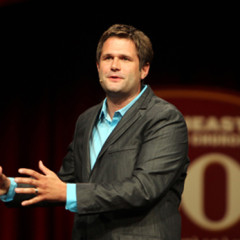
Bestselling author Kyle Idleman says Christians need to learn to take an honest look in the mirror. – Image courtesy of The Lens of Lucid Frenzy (http://bit.ly/1jkRHsr)
Bestselling author and pastor Kyle Idleman says Christians need to take an honest look in the mirror. In his book Aha: The God Moment That Changes Everything, Idleman argues that we need to peer into the mirror and understand our true spiritual condition before we can grow and mature. Here, we discuss his message and what Idleman believes we should do when we look in the mirror and don’t like what we see.
RNS: You say the #1 contributor to spiritual growth isn’t small groups or sermons, but rather difficult circumstances. In my experience, difficulty often causes people to lose their faith or spiritually stumble. How do you reconcile your seemingly idyllic statement with the experiential reality that so many know to be true?
KI: While the Bible consistently teaches that God can use difficult circumstances to deepen and mature our faith, difficulty certainly doesn’t automatically cause spiritual growth. The reality is that these moments in life often take us in one of two directions. We either draw closer to God recognizing our dependence on him, or we push God away and blame him. The reason I used some fairly hard-core examples in the book of people experience spiritual growth through difficult circumstances is because I didn’t want it to seem idyllic. There is nothing easy about spiritual growth that comes through suffering.
RNS: You mention that this book is not about self-help, but rather asking for God’s help. But when we’re really just asking God’s help to improve ourselves, isn’t that the same thing?
KI: It may sound the same to a person who hasn’t experienced the difference. Sitting in different recovery meetings over the years has taught me how much power there is in reaching the point where you say, “If I could’ve changed, I would’ve changed a long time ago.” So this message is central to the truth that “we can’t, but God can.” In order to experience his changing power in our lives, we must first acknowledge that we can’t change, redeem, or save our selves. Jesus came to do what we could never do on our own. The moment we admit helplessness, we are acknowledging that we can’t help ourselves.
RNS: You say that “Aha” happens when a “sudden revelation surprises us with insight and brings long lasting change.” Do you have a word of encouragement for people who’ve begged God for these moments of revelation but haven’t received them?
KI: There are a number of ways that God brings about a sudden revelation. Sometimes the Holy Spirit awakens us through a life circumstance, or insight from a trusted friend. But primarily God brings revelation through Scripture. The Bible promises (Hebrews 4:12; Isaiah 55:11) what many have experienced, that when we spend time reading and meditating on God’s word it encourages, convicts, challenges and equips us.
RNS: You argue that “Aha” moments require “waking up and taking an honest look in the mirror.” What does this look like practically?
KI: The kind of honesty that I am talking about is not generic. In order for it to be effective it needs to be specific and personal. That’s why honesty doesn’t precede awakening. First, there is an awakening or a conviction and then there is honesty and repentance. If a person looks in the mirror and can’t think of anything that they need to be honest about, it’s time to pray for some awakening.
RNS: And what would you say to those of us who look in the mirror and don’t like what we see?
KI: The book is laid out in three sections: Awakening, honesty, action. After we are honest and broken, then it’s time for action. There is no good in being honest with ourselves about ourselves or our situation if nothing changes. The prodigal son sets the example for us. After being honest with himself, he takes action. He gets up and goes back home to his Father. That’s where our honesty should lead us – into the arms of our loving heavenly father who longs for us to come home.







